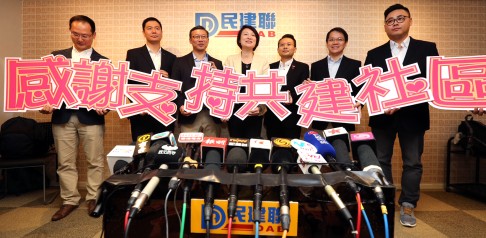Occupy and Hong Kong youth take toll on pro-Beijing parties' share of vote
After the last two district council elections, pro-establishment leaders celebrated joyously. But yesterday they described the results only as "okay" or even "disappointing".

Hit by the rising influence of young voters and last year's Occupy movement, the Democratic Alliance for the Betterment and Progress of Hong Kong, the city's biggest political force in the city, won 119 seats.
Four years ago, they won 136 seats but this was when Federation of Trade Union members were concurrently DAB members. This time, the FTU candidates stood on their own.
DAB chairwoman Starry Lee Wai-king insisted the DAB's number of seats "remained unchanged".
In a statement, the party argued that the DAB's elected councillors had declined to 120 over the last four years, and one of them had decided not to run as a DAB member come election time. So the party only had 119 district councillors before the election, it said.
But it turned out two of the 119 still had dual membership with the FTU.